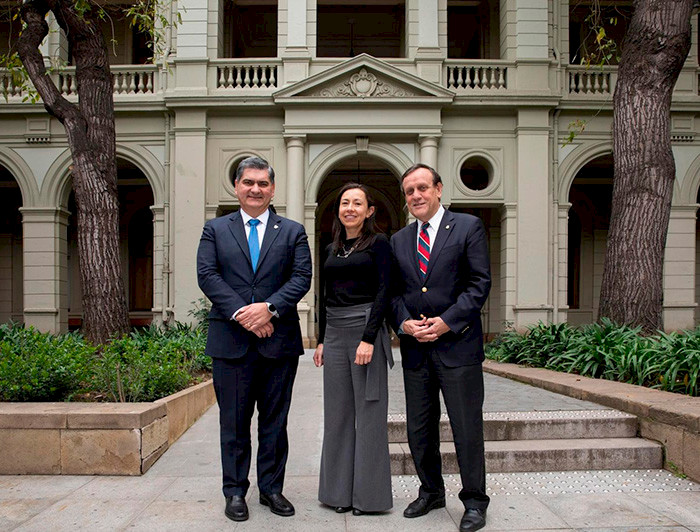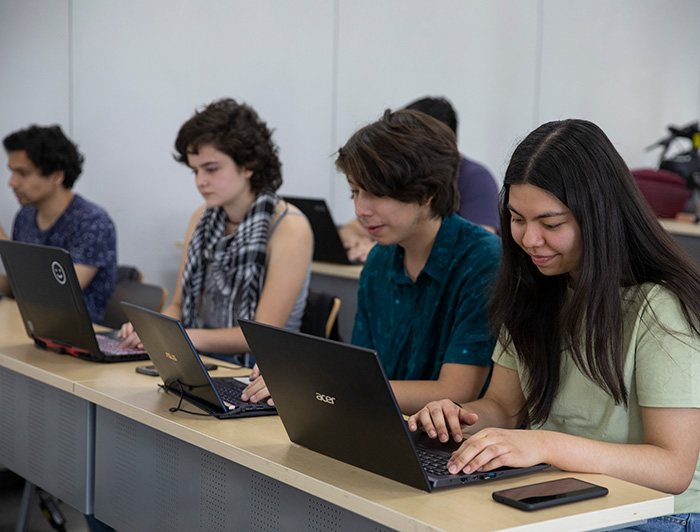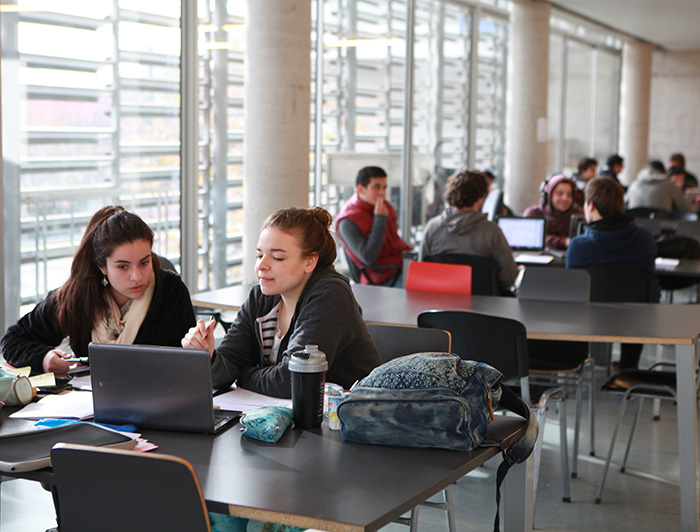
Shaping the Future: Transformative Education in a Changing World
09 July 2024
What are the biggest challenges for education worldwide? What role should universities play in addressing them? What type of education should they provide? These are the questions explored in the following article by the presidents of La Tríada universities: Raquel Bernal of Universidad de los Andes in Colombia, David Garza of Tecnológico de Monterrey in Mexico, and Ignacio Sánchez of UC Chile.

photo_camera From left to right: Presidents David Garza, Raquel Bernal, and Ignacio Sánchez. (Photo by: Karina Fuenzalida)
To educate (from the Latin educere) means to guide individuals out of themselves, leading them to new realities and fostering their growth towards personal fulfillment. High-quality, comprehensive education fosters our growth as diverse and unique individuals. It also equips us with the values essential for a thriving democracy. Education is one of society's most valuable assets, as it prepares us for the unknown. Universities serve as crucial meeting places, where different ways of being and doing can be brought together to foster inclusive, diverse, and resilient societies.
Latin America, with its rich diversity, offers a unique landscape for experimentation and learning. There is a need to redefine and transform education to make it relevant and pertinent, strengthen it through research and creation, and promote the dialogue of knowledge while being open to students of all ages, backgrounds, and walks of life. The current global climate presents significant challenges for education, especially in higher education.
The four main challenges we face today are:
1. The Fourth Industrial Revolution
2. Education for Citizenship in Changing Times
3. Growing Inequality in Multiple Dimensions
4. Changing Expectations of Youth
The Role of Higher Education

The fourth industrial revolution, driven by AI, is changing our lives, work, and interactions. AI offers vast opportunities across fields such as healthcare, energy, environmental care, mining, manufacturing, finance, art, and education. It has made the world deeply connected and impacted human interactions and globalization. AI is transforming how we live and work, creating a need for higher education to adapt to emerging labor demands.
Digital skills are now a priority, as they make it possible to use technology to enhance and complement human activities. Higher education must not only adapt to technology but also guide its development by avoiding biases and ensuring ethical regulation with a humanistic vision. This requires strengthening the arts, humanities, and social sciences.
Universities must also focus on educating exemplary individuals and citizens. As economic sectors, societies, democracies, and personal contexts evolve, citizenship education becomes crucial in a world marked by climate crises, technological advances, and global conflicts.
In Latin America, growing income inequality, which has been intensified by the pandemic and the current technological revolution, poses a major challenge. The global north and urban areas have better resources to access and benefit from technology, while many in Latin America lack access, widening the knowledge gap.
Higher education should strive for equitable and just societies but faces a legitimacy crisis due to exclusion and limited access to educational certifications. Many in Latin America still see higher education as accessible only to minorities, and many students leave without a diploma, eroding the perceived value of higher education.
Lastly, the expectations of new generations differ from those currently shaping their education. They value experience over results, seek high-impact life projects, and are uninterested in long or stable careers. Accustomed to immediacy due to early exposure to digital devices and social media, they have high demands, affecting their learning and interest in acquiring higher education degrees.

Cross-Cutting Competencies
Universities must respond to these challenges and deepen their contributions. Today, we must strengthen foundational competencies that enable people to navigate a changing and uncertain world ethically and with a genuine commitment to the common good. Key competencies that universities should focus on include communication, self-directed learning, creativity, critical thinking, collaboration, adaptability, and change management. These skills will help individuals face uncertainty, pursue diverse life projects, move between occupations and sectors, and contribute to building just, inclusive, and sustainable societies.
We have the responsibility to transform ourselves by creating new knowledge and educating people throughout their lives. Educational innovation should not just respond to new technology but ensure students acquire superior skills. This will require continuous revisions of undergraduate and graduate programs, transforming classrooms into active learning spaces with new management platforms and more flexible integration, implementing significant changes in evaluation methods, and leveraging technology to accommodate the diversity of the student body.
We must support lifelong learning beyond the typical 17 to 25 age range. Competency development must be ongoing to adapt to changing job profiles, support personal life projects, and strengthen social commitment.
In addition to offering post-secondary education, in which each student will be able to design their professional future, higher education should offer flexible, stackable, and inclusive learning pathways. A flexible pathway can be accessed anytime and anywhere; a stackable pathway allows for the accumulation of competencies from various educational offerings; and an inclusive pathway considers the diverse characteristics of students.

Overview
Collaboration between governments, the private sector, and the education sector is vital to enhancing global access to quality education. This ensures more opportunities for individuals to transform their lives, while also impacting economic growth, global development, and equity. This implies equitable access to education at all levels, dismantling existing barriers for marginalized groups and fostering diversity of experiences and perspectives within universities.
Inter- and multiculturalism are crucial elements for learning and societal impact. Diversity enhances problem-solving abilities at both local and global levels, fostering creativity and innovation. Educating for global citizenship entails understanding one's local context, recognizing that global awareness begins at home. To accomplish these goals, early education, flexible educational pathways, and technological integration must be prioritized. These pillars are essential for closing learning gaps and fostering fairer, more sustainable societies.
Universities must remain active in training, research, and creative endeavors to address humanity's significant challenges. The climate crisis, biodiversity protection, geopolitical conflicts, and democracy's fragility demand interdisciplinary efforts. In this new model of higher education, universities should serve as hubs for debate and solutions to both local and global issues, driving technological advancements and producing socially impactful research and creations.
Latin American universities are uniquely positioned to connect with the shared experiences of the global south. We have the experience and capacity to understand and produce knowledge about these realities typically considered to have been overcome by the economic, political, and social development of the West.
By partnering with economic sectors, governments, and civil society, we can collaborate with other institutions and engage various stakeholders in the educational ecosystem. Through these partnerships, we can fulfill our commitment to fostering individual flourishing and contributing to societies that are just, equitable, sustainable, and respectful of diversity. Latin America's universities, including ours, must rise to the challenge effectively to address these pressing issues.
La Tríada is a strategic partnership comprised of Universidad de los Andes in Colombia, Tecnológico de Monterrey in Mexico, and UC Chile. With over five years of collaboration, La Tríada has initiated over 80 joint academic and research projects, which aim to address global challenges from a Latin American perspective.




